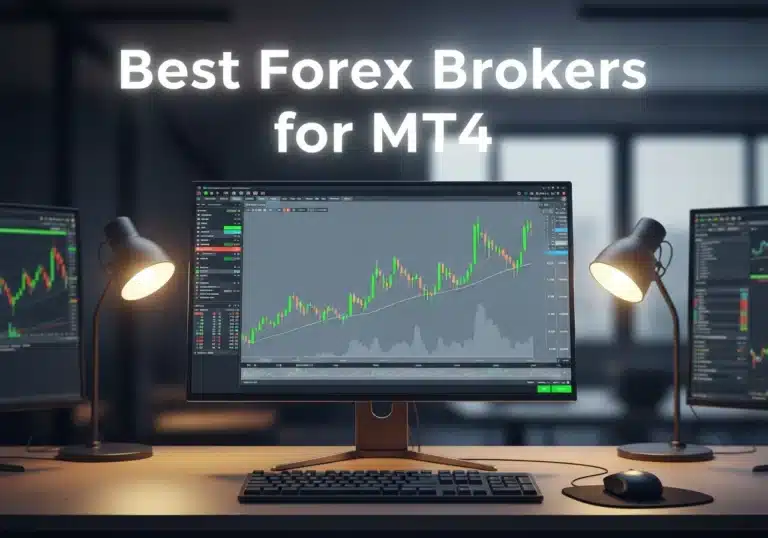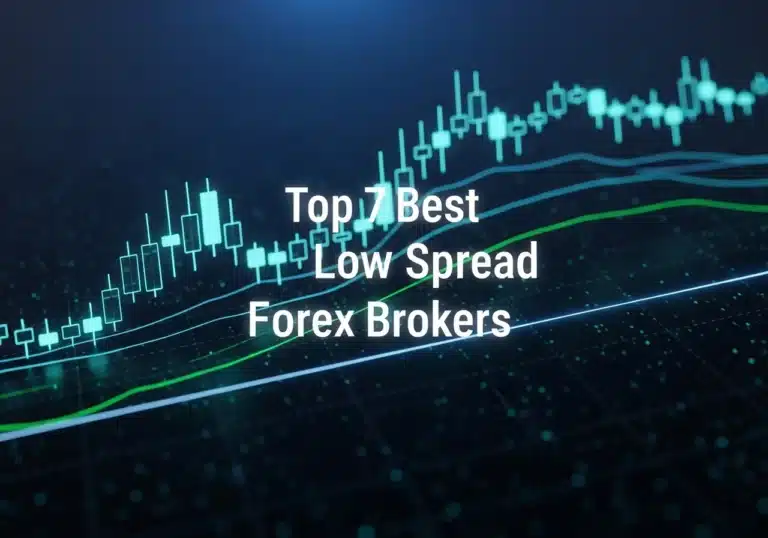Trading anxiety can significantly impact a trader’s decision-making abilities, emotional well-being, and ultimately, their financial success in the markets. Defined as the psychological stress, fear, and emotional tension experienced during trading activities, this condition affects traders of all experience levels. Persistent anxiety can lead to poor trading decisions, missed opportunities, and even complete withdrawal from the markets. For anyone working with a regulated forex broker or engaging in self-directed trading, learning how to deal with trading anxiety is crucial for long-term success.
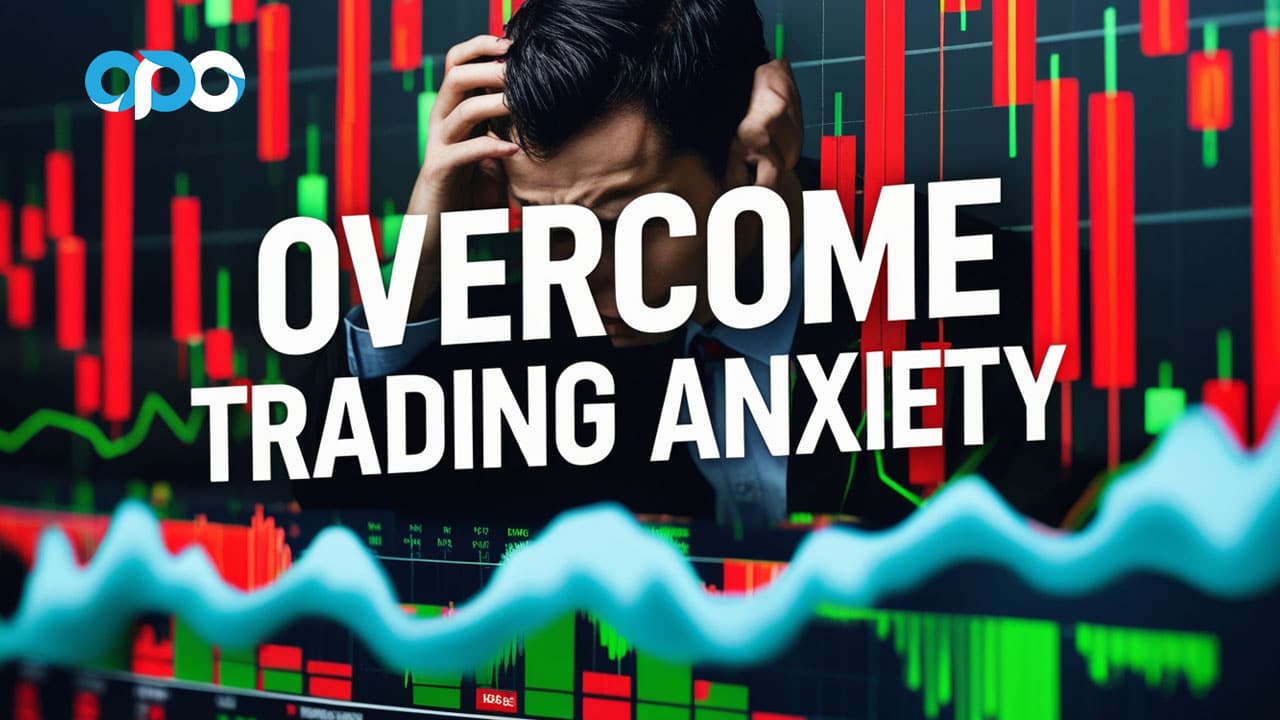
The volatile nature of financial markets creates a perfect storm for psychological pressure, but with the right strategies and mindset, it’s possible to learn how to overcome trading anxiety and develop the emotional resilience needed to thrive as a trader. This guide explores effective approaches for how to deal with trading anxiety.
Understanding the Causes of Trading Anxiety
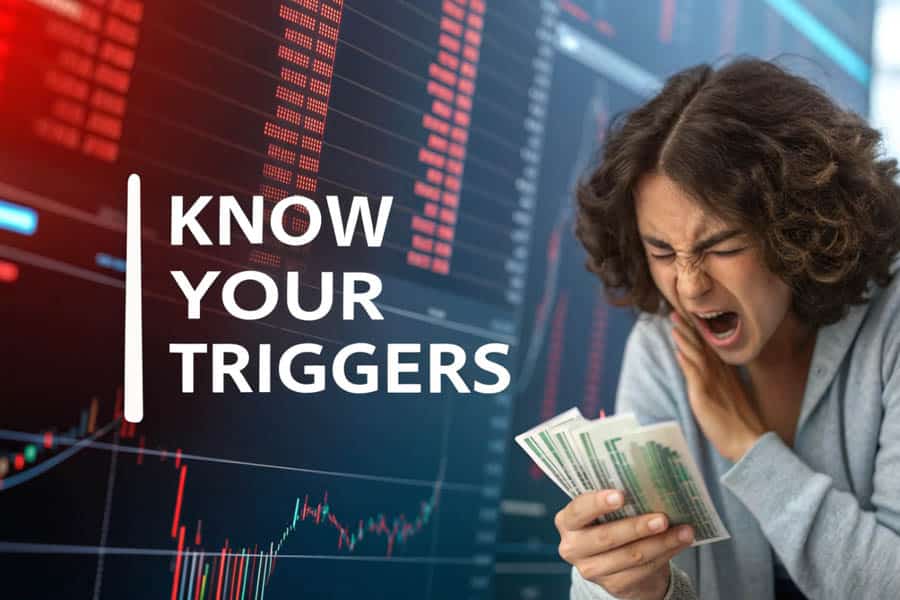
Trading anxiety doesn’t appear out of nowhere. Understanding its root causes is the first step toward effectively managing this common psychological challenge and figuring out how to overcome trading anxiety.
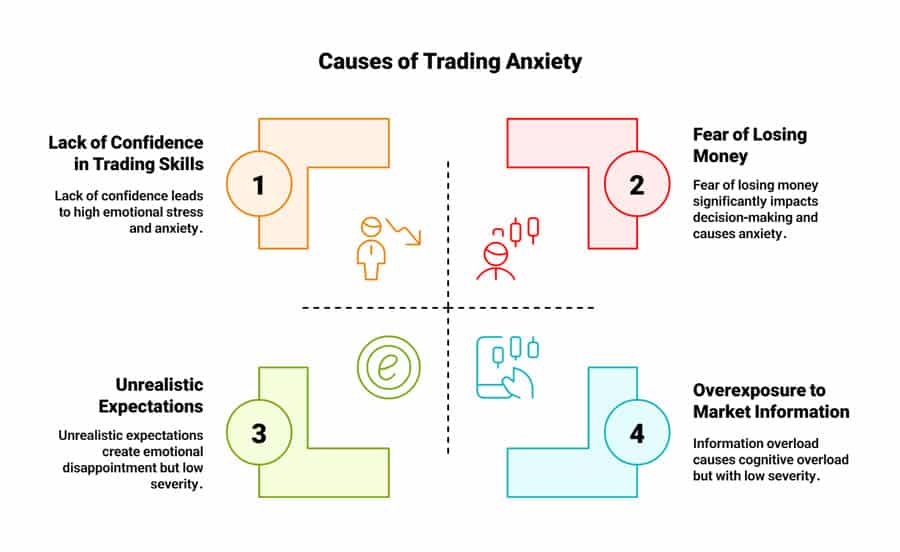
Fear of Losing Money
One of the most prominent causes of trading anxiety is the fear of losing money. When traders invest their hard-earned capital, the prospect of seeing it diminish can trigger intense anxiety. This fear is a major source of loss aversion bias, which can significantly impact investment decision-making. The emotional pain of losses often outweighs the pleasure of equivalent gains, making traders overly cautious or, paradoxically, more prone to risky behavior to recover losses. This fear is central to the challenge of how to deal with trading anxiety.
Lack of Confidence in Trading Skills
Inadequate knowledge and understanding of trading principles can lead to significant anxiety, especially for beginners. When traders don’t feel confident in their ability to analyze markets or execute trades, they experience heightened stress levels. Anxiety is a strong source of herding behavior, where traders follow the crowd rather than trusting their own analysis. This knowledge gap creates uncertainty, which is a fertile ground for anxiety to develop, making it harder to learn how to overcome trading anxiety.
Unrealistic Expectations and Overly Ambitious Goals
Many traders, especially newcomers, fall prey to unrealistic expectations about trading outcomes. The idea of becoming an overnight success or consistently achieving extraordinary returns puts immense pressure on traders. Overambitious attitudes can cause significant anxiety when reality doesn’t match these lofty expectations. Many beginners enter the trading world with images of luxurious lifestyles and quick wealth, setting themselves up for disappointment and anxiety when confronting the reality of trading. Managing expectations is key when learning how to deal with trading anxiety.
Overexposure to Market Information
In today’s digital age, traders have access to an overwhelming amount of market news, analysis, and opinions. This information overload can lead to decision paralysis and anxiety. Constantly monitoring price movements, news feeds, and social media can heighten stress levels and lead to impulsive trading decisions. The excessive focus on market fluctuations can create a state of hypervigilance that exhausts the trader mentally and emotionally, complicating the process of how to overcome trading anxiety.
Recognizing the Symptoms of Trading Anxiety
Identifying the symptoms of trading anxiety is crucial for addressing the issue before it severely impacts your trading performance. Recognizing these signs is the first step in knowing how to deal with trading anxiety.
Read More: Trading Psychology in Forex
Emotional Instability Leading to Impulsive Decisions
Trading anxiety often manifests as emotional volatility, with traders experiencing rapid shifts between fear, hope, greed, and despair. This emotional rollercoaster can lead to impulsive decisions made in moments of panic or euphoria. Stress is a major source of representative bias in decision-making, causing traders to make cognitive mistakes that affect their investment outcomes. The inability to maintain emotional equilibrium is a clear indicator that one needs strategies for how to overcome trading anxiety.
Hesitation or Avoidance of Trades
Anxiety frequently leads to decision paralysis, where traders become unable to pull the trigger on trades despite identifying valid setups. This hesitation often stems from the fear of making mistakes or losing money. In severe cases, traders may completely avoid trading opportunities, leading to missed potential profits and reinforcing the anxiety cycle. This analysis paralysis keeps traders from seizing opportunities due to overwhelming fear of making errors, highlighting the need to learn how to deal with trading anxiety.
Overtrading as a Coping Mechanism
Paradoxically, anxiety can also manifest as overtrading, where traders execute excessive transactions as a way to cope with stress or recover from losses. This behavior is often driven by a gambling mentality rather than sound trading principles. Overtrading weakens mental focus and can lead to disastrous outcomes, as it typically involves trading without proper analysis or adherence to a trading plan. It’s a counterproductive response, underscoring the importance of finding healthier ways for how to overcome trading anxiety.
Strategies to Manage and Overcome Trading Anxiety
Fortunately, there are numerous effective approaches to addressing trading anxiety and developing emotional resilience in the markets. Implementing these strategies is key to understanding how to deal with trading anxiety successfully.

Mindfulness and Meditation Techniques
Practicing mindfulness can help traders stay present and reduce anxiety by focusing on the current moment rather than dwelling on past losses or worrying about future outcomes. Regular meditation has been shown to improve emotional regulation and mental clarity, both essential for effective trading. This is a powerful tool for how to overcome trading anxiety.
Implementation Tips:
- Develop a daily meditation routine, even if it’s just 5-10 minutes
- Practice mindful breathing during market hours to stay centered
- Use body scan techniques to recognize physical signs of anxiety
- Incorporate mindfulness into your pre-trading routine to establish a calm mindset
Musicians with similar performance anxiety have benefited from adopting specific coping strategies, including preparing mentally before performances and maintaining positive thinking. These same principles can be applied to trading when figuring out how to deal with trading anxiety.
Effective Risk Management Practices
Implementing robust risk management is perhaps the most powerful antidote to trading anxiety. When traders know exactly how much they’re risking on each trade and have predefined exit points, they can trade with greater confidence and peace of mind. This is fundamental to how to overcome trading anxiety.
Core Risk Management Principles:
- Always use stop-losses to define your maximum risk per trade
- Limit risk to a small percentage (1-2%) of your account on any single trade
- Avoid overleveraging your positions
- Diversify your trading approaches and markets
Experts emphasize that everything should flow from a defensive posture – defining what’s unacceptable and working from there. This approach creates a psychological safety net that can significantly reduce anxiety while trading, showing a clear path for how to deal with trading anxiety.
Developing a Comprehensive Trading Plan
A well-defined trading plan eliminates much of the uncertainty that breeds anxiety. When traders have clear rules for entry, exit, position sizing, and market conditions, they can reduce emotional decision-making and trade with greater consistency. This structure is vital for learning how to overcome trading anxiety.
Elements of an Effective Trading Plan:
- Specific entry and exit criteria
- Position sizing rules
- Time frames for analysis and trading
- Risk management parameters
- Guidelines for different market conditions
- Trading journal requirements
Creating rules helps develop discipline, which is key to trading sensibly and profitably. A comprehensive plan transforms trading from a series of emotional reactions into a systematic process, significantly reducing anxiety and providing a framework for how to deal with trading anxiety.
Read More: How to Overcome Fear in Forex Trading
Taking Breaks and Practicing Self-Care
Trading requires intense focus and can be mentally exhausting. Regular breaks and proper self-care are essential for maintaining emotional equilibrium and preventing burnout. This is a crucial aspect of how to overcome trading anxiety long-term.
Self-Care Strategies for Traders:
- Establish a consistent sleep schedule
- Engage in regular physical exercise
- Maintain a balanced diet
- Pursue non-trading hobbies and interests
- Set boundaries between trading and personal life
- Schedule regular days off from trading
Balancing trading with self-care, setting realistic goals, and seeking support when needed are crucial for managing stress effectively. Stepping away from the screens periodically helps maintain perspective and prevent anxiety from building up, aiding in how to deal with trading anxiety.
Seeking Support from Mentors and Trading Communities
Trading doesn’t have to be a solitary activity. Connecting with mentors and fellow traders can provide valuable emotional support, perspective, and accountability. Sharing experiences is part of learning how to overcome trading anxiety.
Building a Support Network:
- Join trading forums or communities
- Find a mentor who can guide your development
- Participate in trading webinars or group coaching sessions
- Consider working with a trading buddy who understands your challenges
- Share experiences and solutions with like-minded traders
Social interaction, when positive and constructive, can be beneficial for traders, although it’s important to be aware that it can also be a source of overconfidence bias in some cases.
Visualization and Positive Affirmations
Mental rehearsal techniques and positive self-talk can help traders build confidence and maintain a growth mindset even during challenging market conditions. These are useful psychological tools for how to deal with trading anxiety.
Visualization Practices:
- Mentally rehearse your trading process from analysis to execution
- Visualize yourself remaining calm during volatile market conditions
- Practice seeing both winning and losing scenarios with emotional detachment
- Use positive affirmations to counter negative self-talk
- Develop mantras that reinforce your trading identity and values
These techniques help rewire the brain’s response to market stress and build greater resilience over time, essential for how to overcome trading anxiety.
Using Demo Accounts for Practice
Demo trading allows traders to gain experience and confidence without financial risk. This can be particularly valuable for reducing anxiety while developing and testing strategies, offering a safe space to explore how to deal with trading anxiety.
Effective Demo Trading Approaches:
- Use demo accounts to test new strategies before implementing them with real money
- Practice trade management and emotional control in simulated environments
- Gradually transition to small live positions after demonstrating consistency in demo
- Use demo trading during periods of high anxiety to rebuild confidence
- Create realistic conditions by treating demo trading as seriously as live trading
Starting small is recommended by experts as a way to reduce pressure and potential stress when learning to trade.
Limiting Exposure to Market News
Constant exposure to market news and commentary can fuel anxiety and lead to impulsive decisions. Establishing boundaries around information consumption can help maintain clarity and focus, a key tactic in how to overcome trading anxiety.
Information Management Strategies:
- Set specific times for reviewing market news rather than constant monitoring
- Focus on high-quality, relevant information sources rather than quantity
- Develop filters for distinguishing between noise and significant market developments
- Create a pre-defined process for incorporating new information into your trading decisions
- Consider a temporary news fast if information overload is causing anxiety
Simplifying your approach and sticking to one tested trading strategy at first can reduce second-guessing and avoid analysis paralysis.
Setting Realistic Goals and Expectations
Unrealistic expectations are a major source of trading anxiety. Establishing achievable, process-oriented goals can reduce pressure and build confidence gradually. This mindset shift is crucial for how to deal with trading anxiety constructively.
Goal-Setting Framework:
- Focus on execution quality rather than profit targets
- Set learning and skill development goals alongside financial objectives
- Celebrate process victories regardless of outcomes
- Establish progressive milestones for your trading development
- Compare your performance to your own baseline, not to other traders
Most novice traders fall prey to the idea of achieving extraordinary success quickly, setting themselves up for disappointment and anxiety. Realistic expectations provide a healthier foundation for long-term trading success and learning how to overcome trading anxiety.
Read More: How to Overcome Fear of Missing Out in Trading
Seeking Professional Help When Necessary
When trading anxiety becomes overwhelming or persistent, seeking professional support may be necessary. Therapists familiar with performance anxiety or cognitive-behavioral techniques can provide valuable tools for managing trading-related stress. Sometimes, external help is the best path for how to deal with trading anxiety.
When to Consider Professional Support:
- When anxiety consistently interferes with your trading decisions
- If you experience physical symptoms of anxiety (rapid heartbeat, sweating, etc.)
- When negative thought patterns become entrenched and difficult to change
- If trading anxiety begins affecting other areas of your life
- When self-help strategies prove insufficient
Various psychological factors, including stress, depression, and anxiety, can significantly impact investment decision-making, and professional help may be needed to address these underlying issues.
Pro Tips for Advanced Anxiety Management
For experienced traders looking to further refine their psychological approach, these advanced strategies can help take your mental game to the next level and master how to deal with trading anxiety.
Develop a Pre-Trading Routine
Create a consistent pre-market routine that puts you in the optimal mental state for trading. This might include reviewing your trading plan, setting specific objectives for the day, visualization exercises, and checking your emotional state before entering any positions.

Implement a Trading Journal With Psychological Focus
Beyond tracking trades and outcomes, maintain detailed notes about your emotional states, thought processes, and psychological challenges. Look for patterns connecting your mental state to trading outcomes and develop specific interventions for problematic patterns. This self-reflection is vital for how to overcome trading anxiety.
Create Circuit Breakers for Emotional States
Establish predefined rules that automatically trigger a trading timeout when you detect certain emotional states or behaviors. For example, after two consecutive losing trades, you might mandate a 30-minute break before resuming trading.
Practice Scenario Planning
Mentally rehearse various market scenarios and your desired responses before they occur. This “psychological fire drill” prepares you to respond rationally rather than emotionally when challenging situations arise, improving your ability for how to deal with trading anxiety.
Develop Metacognitive Awareness
Train yourself to observe your own thinking processes during trading. This “thinking about thinking” allows you to catch anxiety-driven thought patterns before they influence your trading decisions.
OpoFinance Services: Supporting Traders Through Advanced Tools and Resources
For traders seeking a supportive environment to learn how to overcome trading anxiety, OpoFinance offers comprehensive solutions designed to enhance trading confidence and performance:
- ASIC Regulation: Trade with peace of mind knowing your broker is regulated by the Australian Securities and Investments Commission (ASIC), providing a secure and transparent trading environment.
- Advanced Trading Platforms: Choose from multiple platforms including MT4, MT5, cTrader, and OpoTrade to find the interface that feels most comfortable and reduces technical anxiety.
- Innovative AI Tools: Utilize AI Market Analyzer, AI Coach, and AI Support to make more informed decisions with less stress and uncertainty.
- Social & Prop Trading: Participate in community trading environments that provide support and reduce feelings of isolation often associated with trading anxiety.
- Secure & Flexible Transactions: Enjoy safe and convenient deposits and withdrawals including crypto payment options with zero fees from OpoFinance, eliminating financial transaction worries.
- Multiple Account Types: Select from Standard, ECN, and ECN Pro accounts with minimum deposits as low as $100, allowing you to start with comfortable position sizes that reduce financial anxiety.

Ready to trade with greater confidence and reduced anxiety? Visit opofinance.com to learn more about how their comprehensive trading solutions can support your trading journey and help you learn how to deal with trading anxiety.
Conclusion
Managing and learning how to overcome trading anxiety is a crucial skill for any trader seeking long-term success in the financial markets. By understanding the psychological factors that contribute to trading anxiety and implementing targeted strategies to address them, traders can develop greater emotional resilience and improve their decision-making capabilities. From basic approaches like mindfulness and risk management to more advanced techniques such as visualization and metacognitive awareness, there are numerous tools available to help traders figure out how to deal with trading anxiety effectively.
The journey to overcome trading anxiety isn’t about eliminating emotions entirely—it’s about developing a healthier relationship with them and preventing them from dominating your trading decisions. By focusing on process over outcomes, implementing robust risk management, and maintaining proper self-care, traders can create an environment conducive to psychological well-being and trading success. Understanding how to deal with trading anxiety is part of this process.
Remember that learning how to deal with trading anxiety is an ongoing process rather than a one-time achievement. Even experienced traders face periods of heightened anxiety and must continuously refine their psychological approach. With patience, self-awareness, and consistent application of the strategies outlined in this article, you can learn how to deal with trading anxiety and transform it from a debilitating weakness into a manageable aspect of your trading journey.
Key Takeaways
- Trading anxiety stems from various sources including fear of loss, lack of confidence, unrealistic expectations, and information overload.
- Effective risk management is the cornerstone of anxiety reduction in trading, creating clear boundaries for potential losses; a key part of how to deal with trading anxiety.
- A comprehensive, well-tested trading plan eliminates uncertainty and provides structure that reduces emotional decision-making.
- Mindfulness techniques and proper self-care are essential for maintaining psychological equilibrium while trading.
- Demo trading and starting with small position sizes can build confidence without overwhelming financial pressure.
- Seeking support from mentors, communities, or professionals can provide valuable perspective and emotional reinforcement when learning how to overcome trading anxiety.
- Setting realistic, process-oriented goals rather than focusing solely on profits creates a healthier trading psychology.
- Advanced traders can further reduce anxiety through pre-trading routines, psychological journaling, and metacognitive awareness, refining their approach to how to deal with trading anxiety.
What role does sleep play in managing trading anxiety?
Quality sleep is fundamental to cognitive function and emotional regulation, both critical for effective trading. Sleep deprivation impairs decision-making abilities, reduces impulse control, and heightens emotional reactivity—all factors that can intensify trading anxiety. Traders should prioritize 7-8 hours of quality sleep and avoid late-night trading sessions that can disrupt sleep patterns. Establishing a consistent sleep schedule helps optimize mental performance and resilience during market hours, creating a foundation for better anxiety management and learning how to deal with trading anxiety.
Can technological tools help reduce trading anxiety?
Yes, technological tools can significantly reduce trading anxiety when used appropriately. Automated trading systems can execute strategies without emotional interference, while risk management tools ensure predefined stop-losses are implemented regardless of emotional state. Portfolio tracking software provides objective performance metrics that counter cognitive biases, and scheduling apps can enforce necessary breaks from the markets. However, technology should complement rather than replace psychological development—the most effective approach combines technological safeguards with personal growth in emotional regulation and trading psychology. These tools can support your efforts in learning how to deal with trading anxiety.
How can I distinguish between intuition and anxiety in trading?
Distinguishing between intuition and anxiety requires developing self-awareness through experience and reflection. Intuition typically presents as a calm, clear signal based on pattern recognition from past experiences, while anxiety manifests as rushed, panicky thoughts often accompanied by physical symptoms like increased heart rate or sweating. Intuition guides you toward or away from a trade based on subtle cues you’ve internalized, while anxiety pushes you to act impulsively or freeze completely out of fear. Keeping a detailed trading journal that tracks both decisions and emotional states can help you learn to differentiate between these experiences over time, aiding in your journey to overcome trading anxiety.



